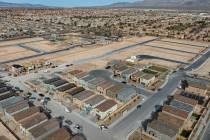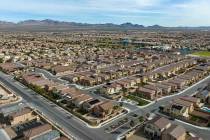Local home prices decline while those in other big cities rise, data show
WASHINGTON -- Las Vegas continues to lag the nation in home prices.
Home prices rose for the second straight month in most major U.S. cities and are stabilizing after years of declines. But analysts say the trend in prices hardly signals a rebound for the troubled housing market.
A flurry of spring buyers is helping boost sales. At the same time, millions of foreclosures are in limbo, awaiting the results of a government investigation into improper practices by mortgage lenders. Once that investigation is complete, banks will resume seizing homes and prices will likely fall again.
The Standard & Poor's/Case-Shiller home-price index released Tuesday showed that prices rose in May in 16 of the 20 cities tracked.
Boston, Minneapolis and Washington posted the biggest monthly increases.
Prices in Detroit, Las Vegas and Tampa, Fla. -- three cities hit hardest by the housing crisis -- fell to their lowest points since the recession began.
Las Vegas-based Home Builders Research reported the median existing-home price at $110,000 in June, a $1,000 decrease from May and down 13 percent from $126,000 a year ago. Existing-home prices have dropped to a 20-year low, according to the local housing research firm. New-home prices increased 7.4 percent to $200,826 in June.
A couple of phenomena are keeping home prices depressed in Las Vegas, said Nasser Daneshvary, director of the Lied Institute for Real Estate Studies at the University of Nevada, Las Vegas.
About 40 percent of home purchases in Las Vegas during the boom years of 2005 and 2006 went to investors and second-home buyers. Those homes were the first to get dumped back onto the market during the recession, Daneshvary said.
Another factor is the job market. People who lost their jobs have tried to hold onto their homes while they looked for work, but they gave up hope in the last year or two and let their homes go to foreclosure, he said.
"We have much more to give because our market was the hottest and now we have too much inventory," Daneshvary said. "I'm giving up on saying how long it will take to get back."
Price declines have been shrinking through the year. Seasonally adjusted prices have fallen a modest 1.2 percent over the past six months, according to the index. That's roughly a third of the decline from the previous six months.
But analysts say the weakening job market and the uncertainty over foreclosures could lead to deeper price declines in the second half of the year. They estimate prices will fall another 5 percent to 10 percent by year's end.
"The aggregate economy is at a turning point and there is much uncertainty now," said Robert Shiller, a Yale professor and co-founder of the home-price index.
David Blitzer, chairman of S&P's index committee, said the month-over-month increases in May were attributed to a "seasonal period of stronger demand for houses." Such increases are expected, he said.
After adjusting for seasonal factors, such as spring buying, prices fell in 11 markets.
"Sustained increases in home prices over several months and better annual results need to be seen before we can confirm a real estate market recovery," he said.
Over the last 12 months, prices have fallen in 19 of the 20 cities tracked.
Housing remains the weakest part of the economy. High unemployment, larger down payment requirements and tighter credit are preventing many buyers from entering the market. Many who can afford to buy are waiting because they are worried prices have yet to hit bottom.
Foreclosures and short sales -- when a lender agrees to sell for less than what is owed on a mortgage -- made up about 30 percent of all home sales last month, up from about 10 percent in past years. And 1.7 million potential foreclosures are being held up, according to real estate firm CoreLogic, either by backlogged courts or lenders awaiting state and federal probes into troubled foreclosure practices.
At least 10 percent of homeowners are 90 days or more past due on their mortgage payments in nine major U.S. cities, according to CoreLogic. The national average is 7.4 percent.
Most of those areas are well-known trouble spots, including Atlanta, Las Vegas, Phoenix, Tampa, Fla., and Riverside, Calif. But others haven't been as battered, including Chicago, Orlando, Fla., Long Island, N.Y., and Sacramento, Calif. That suggests the weakness in the housing industry is nationwide, economists say.
"We're just really bouncing along the bottom right now," IHS Global Insight senior economist Chris Christopher said. "Even with the positive news, there's nothing very meaningful in these reports to show we're coming back up. It's just little blips here and there."
Review-Journal writer Hubble Smith contributed to this report.
At a glance
PRICES RISE: Home prices rose in May for the second straight month in most major U.S. cities.
SPRING BOOST: A flurry of spring buyers is helping boost sales. Analysts say the upward trend in prices is temporary and hardly signals a rebound.
FORECLOSURES, JOBS: Millions of foreclosures are in limbo, held up by a government investigation into improper practices by mortgage lenders. When the probe is complete, banks will resume seizing homes and home prices will likely fall further. The weakening job market could also hasten price declines.























